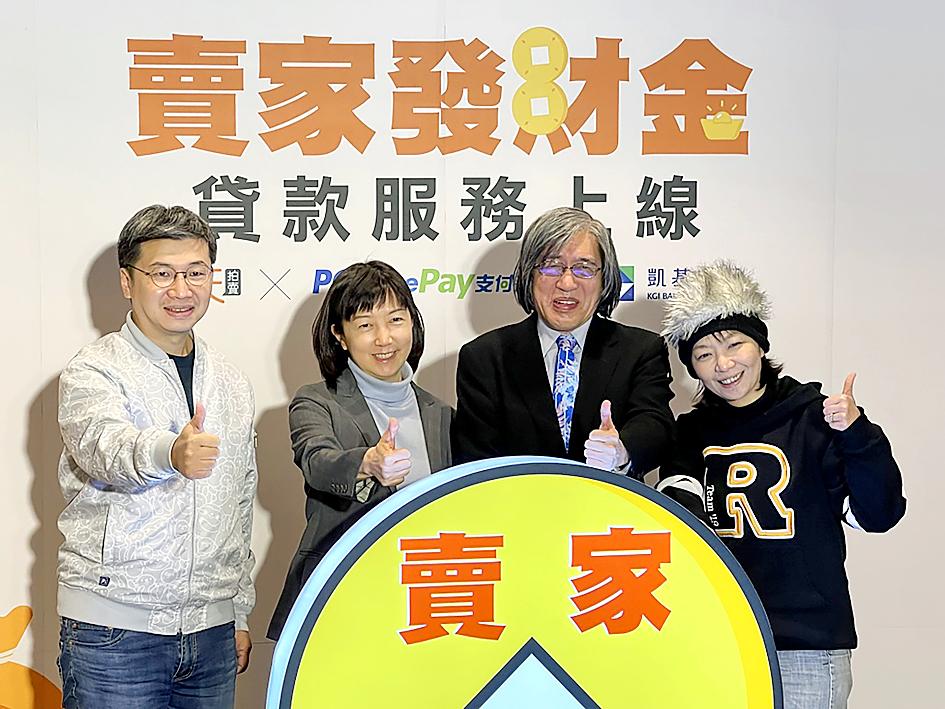E-commerce company PChome Online Inc (網路家庭) has pledged to invest NT$2.9 billion (US$101.9 million) in a new smart logistics center in Taoyuan, the Ministry of Economic Affairs said yesterday.
The project is part of the government’s Invest in Taiwan initiative to increase the nation’s competitiveness and sophistication in manufacturing, InvesTaiwan Service Center interim spokeswoman Nicole Chen (陳明珠) said.
“It doesn’t matter if it is a manufacturing project or a service sector project. The initiative is looking for smart projects with a high degree of automation,” Chen said.

Photo: CNA
The logistics center in the Chunghwa Post Logistics Park (中華郵政物流園區) in Taoyuan’s Gueishan District (龜山) would enhance PChome’s delivery capability and help ship Taiwanese products from small and medium-sized businesses to overseas markets, she said.
The company yesterday did not elaborate on the investment. PChome chairman Jan Hung-tze (詹宏志) in May 2019 said that the company would invest NT$3 billion to set up systems and equipment in the new logistics center, and create up to 5,000 jobs.
The ministry also announced that Winway Technology Co (穎崴科技), which provides semiconductor testing interfaces, broke ground on a NT$3.25 billion investment in Kaohsiung’s Nantze Export Processing Zone (楠梓加工出口區).
Describing Winway as a “hidden champion in semiconductors,” Vice Minister of Economic Affairs Lin Chuan-neng (林全能) said that the investment would complete the semiconductor cluster at the zone.
Winway would provide services to ASE Technology Holding Co (ASE, 日月光投控) and NXP Semiconductors NV, which also have facilities in the zone.
“The ministry will keep investing in the zone to make it a quality semiconductor manufacturing hub,” Lin said.
The Winway project, which is also part of Invest in Taiwan, is expected to generate NT$1 billion in annual output and create 200 jobs, the ministry said.
Export Processing Zone Administration Director-General Huang Wen-guu (黃文谷) said that the zone is “nearing capacity,” urging the government to expand the zone.
“We look forward to the zone being renamed, as this would reflect the increasingly diverse high-tech companies with facilities in the zone,” Huang said, referring to the zone’s proposed rebranding as technology industrial park, a plan pending Executive Yuan approval.

With this year’s Semicon Taiwan trade show set to kick off on Wednesday, market attention has turned to the mass production of advanced packaging technologies and capacity expansion in Taiwan and the US. With traditional scaling reaching physical limits, heterogeneous integration and packaging technologies have emerged as key solutions. Surging demand for artificial intelligence (AI), high-performance computing (HPC) and high-bandwidth memory (HBM) chips has put technologies such as chip-on-wafer-on-substrate (CoWoS), integrated fan-out (InFO), system on integrated chips (SoIC), 3D IC and fan-out panel-level packaging (FOPLP) at the center of semiconductor innovation, making them a major focus at this year’s trade show, according

DEBUT: The trade show is to feature 17 national pavilions, a new high for the event, including from Canada, Costa Rica, Lithuania, Sweden and Vietnam for the first time The Semicon Taiwan trade show, which opens on Wednesday, is expected to see a new high in the number of exhibitors and visitors from around the world, said its organizer, SEMI, which has described the annual event as the “Olympics of the semiconductor industry.” SEMI, which represents companies in the electronics manufacturing and design supply chain, and touts the annual exhibition as the most influential semiconductor trade show in the world, said more than 1,200 enterprises from 56 countries are to showcase their innovations across more than 4,100 booths, and that the event could attract 100,000 visitors. This year’s event features 17

EXPORT GROWTH: The AI boom has shortened chip cycles to just one year, putting pressure on chipmakers to accelerate development and expand packaging capacity Developing a localized supply chain for advanced packaging equipment is critical for keeping pace with customers’ increasingly shrinking time-to-market cycles for new artificial intelligence (AI) chips, Taiwan Semiconductor Manufacturing Co (TSMC, 台積電) said yesterday. Spurred on by the AI revolution, customers are accelerating product upgrades to nearly every year, compared with the two to three-year development cadence in the past, TSMC vice president of advanced packaging technology and service Jun He (何軍) said at a 3D IC Global Summit organized by SEMI in Taipei. These shortened cycles put heavy pressure on chipmakers, as the entire process — from chip design to mass

SEMICONDUCTOR SERVICES: A company executive said that Taiwanese firms must think about how to participate in global supply chains and lift their competitiveness Taiwan Semiconductor Manufacturing Co (TSMC, 台積電) yesterday said it expects to launch its first multifunctional service center in Pingtung County in the middle of 2027, in a bid to foster a resilient high-tech facility construction ecosystem. TSMC broached the idea of creating a center two or three years ago when it started building new manufacturing capacity in the US and Japan, the company said. The center, dubbed an “ecosystem park,” would assist local manufacturing facility construction partners to upgrade their capabilities and secure more deals from other global chipmakers such as Intel Corp, Micron Technology Inc and Infineon Technologies AG, TSMC said. It